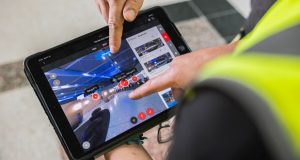According to a Mintel report*, the adoption of newer interoperable security technology has accelerated during the pandemic. Which technologies do you predict will have the greatest benefits for the security of premises, be they offices, retail, manufacturing or health care? And how can FMs ensure their suppliers provide high quality service and maintenance support?
 SECURITY PROVIDER’S VIEW
SECURITY PROVIDER’S VIEW
PAUL LOTTER, MANAGING DIRECTOR,
ROB HILL, COMMERCIAL DIRECTOR, CORPS SECURITY
Suppliers can only provide high quality service if they ask the FM teams the right questions. That’s the first step in mitigating specific risks to premises. It’s important to recognise individual security drives for a business, and how serious and prevalent these risks are. Then it’s a case of demonstrating the know-how involved in adding value to the security provision on offer. It’s about implementing the right solution that will take care of your assets and people.
 With more businesses undertaking flexible working models, the demand for CCTV and intruder and fire alarm monitoring services for vacant premises looks to increase. Sites previously monitored overnight and at weekends may now require 24/7 monitoring.
With more businesses undertaking flexible working models, the demand for CCTV and intruder and fire alarm monitoring services for vacant premises looks to increase. Sites previously monitored overnight and at weekends may now require 24/7 monitoring.
But as COVID restrictions fall away in a post-lockdown world, customers who were previously reluctant to invest in security technology are seeing the benefits of a blended approach to security – where tech complements security officers and responds to the individual business security needs of each site. Some buildings can be remotely locked, and the lights switched off at night, leaving BMS systems to track lower risk points while monitoring temperature, potential flooding and break-ins.
The security industry is currently preparing for the switching off in 2025 of the UK’s public switched telephone network (PSTN) which is set to affect anything running off PSTN or ISDN lines including CCTV, faxes, EPOS machines, alarm and door entry systems. Companies will need to start planning now to ensure their systems remain functional when the UK moves from a PSTN to a digital model. The response will be a greater emphasis on fully integrated building management systems to create smarter premises that securely control access and egress, with integrated AI for monitoring specific risk points at all hours. These systems will also provide expert data to finetune risk management.
Larger estates will benefit from services such as Corps KeySafe – an integrated service leveraging the benefits of Bluetooth-enabled key safes and smart response systems that allow the nearest authorised person to access keys while recording a precise audit trail. This has been particularly beneficial in the care sector during COVID-19, enabling care workers and authorised individuals to gain access to homes for private care while maintaining limited contact.
Web portal and smartphone applications allow colleagues to access data showing shifts worked, holiday and absence management, pay information, and uniform orders, as well as information about health benefit schemes. Corps Secure, our bespoke customer portal provides a dashboard that illustrates the customer’s full security operation in real-time, from incident reports to site visits, security officer shift patterns and training records, all site-specific documentation as well as all billing information and KPIs.
Security doesn’t end at the protection of a business’s property and assets – safeguarding its people has to be a top priority. Corps Guard, is a personal protection support application, downloaded directly to a smartphone. Its aimed at colleagues who are operating remotely, in potentially dangerous situations or commuting at night through threatening areas.
Any technology integration is an investment but, done smartly, can reduce a business’s overall security spend. The cost savings realised from having people on site only when necessary, for example, offers a great opportunity for businesses to invest this back into their people, paying the Real Living Wage, upskilling officers and training them to work with new technologies more efficiently.




